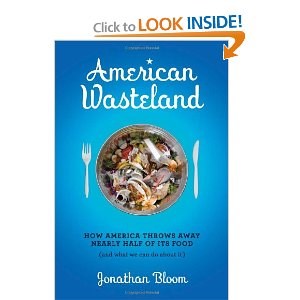
05 April . 2011
Food Waste: Why do I care?
By Jonathan Bloom
Author, American Wasteland
Hi everyone, Shannon McSwiney from Briar Chapel here...We have been chatting on our blog (and in other social media circles) a lot about the upcoming chef challenge in our local schools. We also just shared the details about our favorite day of the year in our Earth Day Welcome. With all of this talk about food, Earth Day, and being better to our environment, how fitting it should be that we introduce you to a local author that will be joining us on April 16th to bring to light a topic that many of us probably don't spend enough time focusing on, and that is food waste.
I'll let Jonathan take it from here, but please come out to Briar Chapel on April 16th to hear more from Jonathan as well as other fabulous non-profit organizations, restaurants and local merchants that will share their 'recipe' for living a healthier, more sustainable life.
If you've ever thought about food waste, this thought has probably passed through your mind: Why do I even care?
Or maybe you've heard about wasted food's ramifications before but find yourself in need of a refresher. In either case, it's never a bad thing to consider why we shouldn't squander food. So here goes:
There are environmental, ethical and economic reasons why food matters. The environmental implications of food waste alone make it worth avoiding. A massive amount of resources--mostly oil and water--go into producing our food. When we don't use roughly 40 percent of it, we're squandering those embedded resources.
In addition, when we send food to the landfill, its anaerobic rotting creates methane. That greenhouse gas is more than 20 times as potent at trapping heat as CO2. Given that and our staggering rate of waste, our food-filled landfills are steadily aiding climate change. Landfills are the number two source of human-related methane emissions. And while some landfills have systems in place to either destroy or harness its methane, they aren't all that efficient.
From an ethical standpoint, it's pretty simple. When you consider that 15 percent of U.S. homes are food insecure, throwing away food is morally callous. And no, the food you leave on your plate isn't going to feed anyone (here or in a developing nation). But that doesn't mean you couldn't donate excess food instead of preparing too much. Or buy less food--to reduce the amount you'll discard--and pass the savings along to your local food bank.
And finally, it doesn't make much economic sense to throw away a good without using it. That holds true for individuals, families, institutions and government. Depending on spending habits, a family of four throws out between $1,300 and $2,200 a year. And on the whole, America squanders out $160 billion annually. In both cases, it's a waste of money that could better be spent elsewhere.
To be fair, we're never going to completely eliminate food waste. There will always be some stuff that slips between the cracks. But for all three of the above reasons, we should strive to reduce the waste we do create. Do you care enough to make an effort?
Check back with me as I continue to explore the topic and offer solutions that you can try in your own home.
